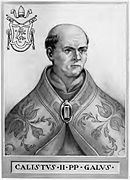Papal election, 1119

Coat of arms during the vacancy of the Holy See
|
|
| Dates and location | |
|---|---|
| 29 January – 2 February 1119 Cluny Abbey, Cluny, Saône-et-Loire, France |
|
| Elected Pope | |
|
Guy de Bourgogne Name taken: Callixtus II |
|
 |
|
The papal election from January 29 to February 2, 1119 was, by an order of magnitude, the smallest papal election of the 12th century currently considered legitimate by the Roman Catholic Church.
Pope Gelasius II had died in Cluny having been expelled from Rome by Henry V, Holy Roman Emperor, as a result of the Investiture Controversy. Probably only two cardinal bishops, four cardinal priests and four cardinal deacons participated in the election. The election took place in Cluny Abbey in France, while the rest of the College of Cardinals remained in Rome. A non-cardinal Guy de Bourgogne, the Archbishop of Vienne, was elected Pope Callixtus II, and crowned in Vienne on February 9; Callixtus II reached Rome on June 3, 1120.
Probably ten cardinals took part in the election.
The cardinals attending the death mass of Gelasius II in Cluny in late January 1119 were divided over whether his successor should be elected on the spot (as was permitted by In Nomine Domini) or whether they should return to Rome and hold the election with the full College of Cardinals; although the cardinals proceeded with the election immediately, they agreed that they would submit their choice to the entire College thereafter. The cardinals which accompanied Gleasius II to Cluny are known from Liber Pontificalis associated with "Pandulphus" (either Pandulf of Pisa or Pandulf of Lucca), from the charter from Cluny, and from the chronicle of Ordericus Vitalis.
Although the contemporary accounts diverge on many points, it is clear across them that the two candidates that emerged were Guy and Pontius of Cluny, both named as candidates by the late pontiff. The account of Gaufrid, prior of Vigois, relates that Gelasius II had preferred Pontius and predicted his election; Pontius was a far more conciliatory candidate, likely to negotiate a solution to the Investiture Controversy. Two accounts in particular—those of Bernard of Carrion and Gaufrid of Vigois—detail the election of Guy, emphasizing the importance of his known confrontational stance towards Henry V (having previously excommunicated him) and his powerful family, the Salian dynasty.
...
Wikipedia
